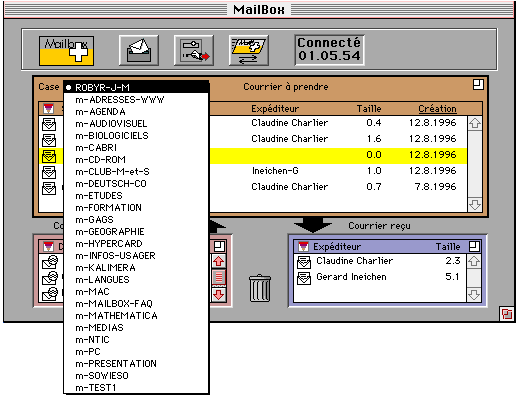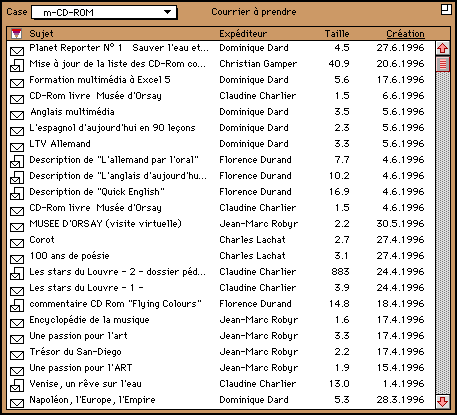![]() PLEASE NOTE THAT THIS DOCUMENT IS A DRAFT DOCUMENT
PLEASE NOTE THAT THIS DOCUMENT IS A DRAFT DOCUMENT![]()
The FETICHE Project
a SOCRATES, Open and Distance Learning Project
FETICHE, the C.I.P.'s Component :
Market-Places: "MailBox" Activities
Raymond Morel and Pierre Dunand Filliol
A Setting
This experiment takes place within the context of courses in continuing education offered to the whole teaching community of the Canton of Geneva. More specifically, we are dealing here with continuing education in the domain of New information and Communication Technologies (NICT) and with pedagogical telematics. The example chosen here is the implementation of pedagogical activities in the virtual market-place with the "MailBox" communication software.
B A few explanations
Continuing education of teachers is the task of the C.I.P.; specifically, this institution is providing the bulk of the training in NTICs in the Geneva canton school system. Thus, the global offer for this academic year is constituted by sixty full days of courses, a few dozens of seminars and manage some six hundred inscriptions to various activities. It is an integral part of the annual offer in continuing education and professional development offered to the entirety of the teaching staff of the Geneva schooling system (elementary, primary, secondary and high-school levels, including professional training institutions, adults' training, etc.). The themes and domains treated by the various seminars and courses is pretty varied.
During the academic year, these courses may be completed by additional activities, taken on a voluntary basis:
· by taking part to the meetings of different work-groups;
· by logging on to different "market-places" (names given to telematics forums on agreed common themes);
· by assisting to thematic meetings on given subject-matters (conferences, demos, etc.)
E.g. After a seminar on the pedagogic uses of multimedia, or on teaching languages with the help of NICTs, or on a given software package, a given teacher may be helped, encouraged and also get some practical help through colleagues by logging on a "market-places" and/or a users' group according to his interests.
As far as pedagogical uses of telematics are concerned, after using for six years the VideoText services, with up to 1600 users involved, the C.I.P. developed, within the framework of the European Project TRIBUNE, a users' friendly communication software package named "MailBox". This software has been designed in order to ease electronic exchanges and communications among the different partners of the Geneva school system.
MailBox is not simply another software package for X400 e-mail between PCs and Macintosh Computers with LANs and shared file transfer protocols. More important, by using the metaphor of the post office box, it is a shared common interface that facilitates distance co-operative and collaborative efforts. As a reference to Les Green's metaphor, these virtual communities have been called "market-places" (represented in the figures below, by <m-USERS-GROUP NAME>).
The implementation of these market-places has taken place during the academic year of 1995 to 1996. Towards end of June, there were more than twenty of them, operating over periods of several weeks to a couple of months (see figure 1).

figure 1
C Contribution
The contents of some of these market-places (see figure 2, exemplifying the CD-ROM market-places, called "m-CD-ROM" in the software), the way they are organised, their management and their uses represent meaningful examples of how electronic communication is being used for pedagogical purposes.

figure 2
D Collaborative efforts
This specific theme has been drafted during the London meeting of May 15 and 16 1996 (please refer to "The Picnic" - first draft).
E Actors
According to specific market-places, particular actors will be active within active dyads such as teacher/teacher, student/teacher, teacher-trainer/teacher, etc.
F Up-Dating Process
The process of creation of market-places being a continuous one, the C.I.P. manages and respond to the needs of various users. One may imagine a number of scenarios on already existing schemes and/or original needs such as :
- opening for a certain time a "users' needs" market-places or
- using an existing market-places to observe or evaluate some meaningful parameter or
- managing a users group according to a specific methodology, etc.
Geneva, C.I.P., TECFA August 1996
![]() PLEASE NOTE THAT THIS DOCUMENT IS A DRAFT DOCUMENT
PLEASE NOTE THAT THIS DOCUMENT IS A DRAFT DOCUMENT![]()